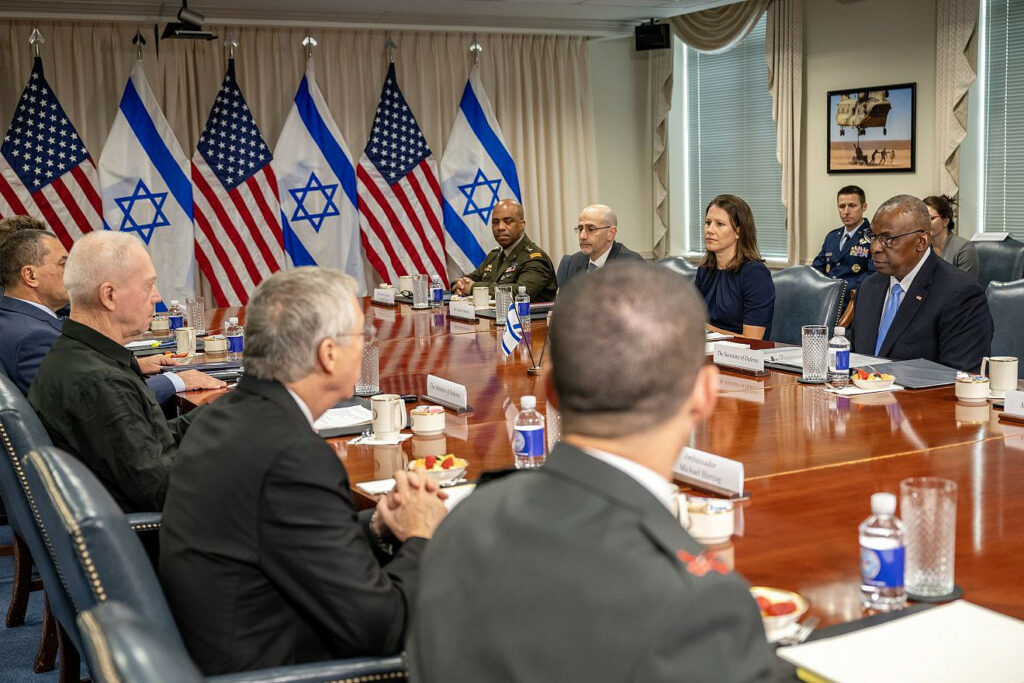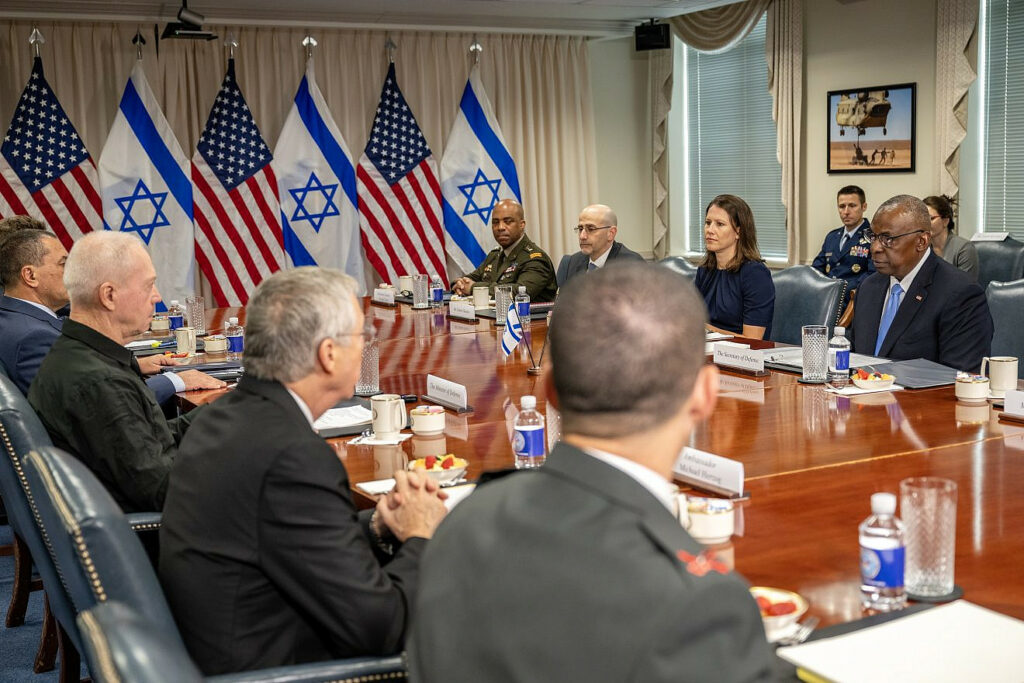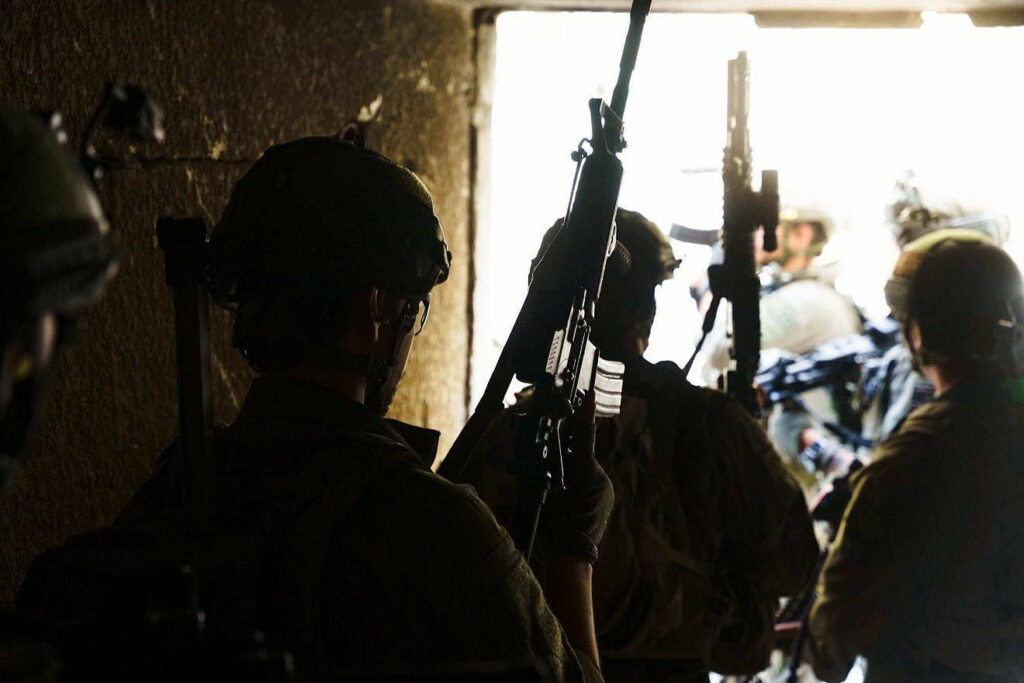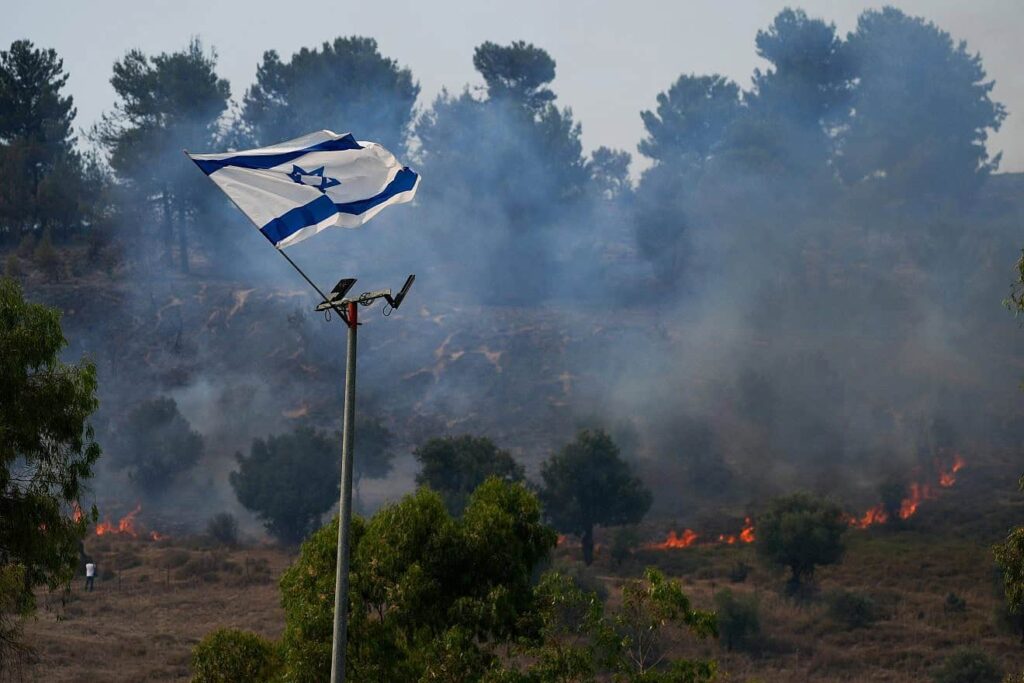
US defensive role in the spotlight as regional tensions mount
Air defense, ammunition, and intel-sharing are vital, but offense is left to Israel.
The United States’ role in the Middle East has been in the spotlight in recent days as tensions mount between Israel and the Iranian-Hezbollah regional terror axis.
On June 24, the chairman of the U.S. Joint Chiefs of Staff, Gen. Charles Q. Brown, cautioned that in any full-scale war between Israel and Hezbollah, it would be “harder for us to be able to support them [Israel] in the same way we did back in April,” according to Reuters. Brown was referring to Iran’s April 14 missile and drone attack on Israel, which the United States played a key role in defending the Jewish state against.
Brown also assessed that Iran would be more inclined to support Hezbollah directly, in other words via military intervention, than it had been the Hamas terror group in Gaza, “particularly if they felt that Hezbollah was being significantly threatened.”
On June 25, meanwhile, U.S. officials reportedly issued a rare warning to Hezbollah, stressing that America would support Israel’s self-defense against any aggression. Two U.S. officials told Politico that Hezbollah should not expect the United States to rein Israel in should a war break out. Hezbollah needs to understand that Washington will help Israel defend itself, the officials emphasized.
According to Brig. Gen. (res.) Yossi Kuperwasser, former head of the Research and Assessment Division of Israel’s Military Intelligence, Brown’s comments did not indicate a shift in policy, but were a reflection of the greater technical and operational difficulties involved in intercepting Hezbollah’s arsenal compared to that of Iran.

“The U.S. input was more significant in that scenario,” he said, referring to Iran’s April 14 attack. “The United States can’t provide that level of assistance against a potential Hezbollah assault due to the proximity and scale differences [of the projectile arsenal possessed by Hezbollah],” he added.
Kuperwasser, currently a senior research fellow at the Misgav Institute for National Security and Zionist Strategy, noted that the United States has historically focused on defensive assistance rather than direct offensive actions in the Middle East.
“The policy of aiding Israel in defense only is not new; the Americans are always ready to help Israel in defense,” Kuperwasser stated. He highlighted the U.S.’s consistent support in joint exercises and defensive measures.
At the same time, the United States has largely steered clear of offensive operations in the region, he said.
For instance, he added, “They did not take it upon themselves to handle the Iraqi nuclear reactor, nor the Syrian nuclear reactor.”
He emphasized however that this does not diminish the importance of the U.S. role in the region.
“We have seen how important this matter is,” he stated. “I would not trivialize the assistance in defense. It’s important, but of course this leaves Israel the offensive dimension.”

Some notable exceptions, said Kuperwasser, include the intelligence assistance that the United States provided ahead of Israel’s June 8 hostage rescue raid in Gaza.
He stressed the importance of intelligence sharing and the continued flow of ammunition and supplies from the United States to Israel—a subject that was discussed during Israeli Defense Minister Yoav Gallant’s meetings with American defense officials in Washington this week.
With regard to Hezbollah, Kuperwasser said, “The Americans have to be convinced that every effort has been made to reach a solution on this issue.”
For its part, Washington was doing everything it could to convince Hezbollah to take a step back, he said. However, it is Hezbollah chief Hassan Nasrallah, in consultation with Iran, that will make the final decision on this matter, he added.
According to Hussain Abdul-Hussain, a research fellow at the Washington-based Foundation for Defense of Democracies, the inconsistency of U.S. Middle East policy is causing problems.
“Moderate Sunni states are suffering from the inconsistency of Biden’s foreign policy,” he told JNS. “Washington [the Biden administration] has done everything and its reverse since it came to power,” he stated. For example, it removed the Iranian-backed Houthis from the terrorism list, then relisted them. It demanded that Saudi Arabia end its war on the Houthis in Yemen, but then launched a military campaign against the Houthis and invited the Saudis to join it.

Abdul-Hussain also noted the United States’ fluctuating stance on Iran and its implications for regional alliances.
“Biden has been inconsistent on Iran, promising to revive the [2015 JCPOA nuclear] deal with it, but now standing in a no-man’s land, neither coming to terms with it nor pressuring it,” he stated. This inconsistency, he argued, undermines trust among U.S. allies.
“If America cannot help its closest ally Israel beat an organization that America classifies as terrorist, how will America defend Bahrain if Iran decides to send its militias against it?” he asked.
This unpredictability was driving Sunni states to reassess their alliances and relations with Washington, he stressed.
“Bahrain is now in talks to restore ties with Iran,” he noted. “And If Iran becomes nuclear, like everyone in the region expects it will because Biden is not stopping it, then it’s better for these Sunni states to be on the good side of the bully and its militias,” he said. “Sunni states are behaving like America does not exist. They cannot afford to bet on a power that doesn’t show up when the shooting starts.”
** This article was originally published on JNS. Org **
The post US defensive role in the spotlight as regional tensions mount appeared first on Israel365 News.
Israel in the News